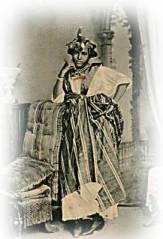Extracts from Mother Africa's Baby Names
THE WESTERN DIASPORA
Conquest and slavery have gone hand in hand ever since the bonds of brotherhood of man were broken. When the
first European ships weighed anchor off the shores of Africa they came upon a long established system of slave
trading.
1411 A.D. is considered by some to have been the beginning of the Atlantic slave trade from Portugal. The
Portuguese were particularly active in Angola and the Kingdom of Kongo. In the sixteenth century, the Spanish
crown permitted the removal of African slaves to work in the mines of Hispanola. On the other hand, the first
people the English met who offered slaves were the Arada of Northern Nigeria. They were later supplanted by the
Hausa, the Fulani, the Ashanti, the Benin Kingdom and the Futa Jalon. The Fanti were known to be the middlemen
and they were also sold.
The evidence of the well organized and established slave networks which dated back to the caliphates and the
Ottoman Empire can be seen in the diversity of names of persons found on the Barbados slave lists which are
peculiar to tribes far distant from those West Coast slave centres which fed the European need for bought labour.
According to the Igbo historian, Catherine Ocholonu, the majority of the West African diaspora in the Americas
were taken from the state of Akwa in Nigeria. The Ngwa State was populated by Ibos and they were also targeted.
Barbados had been the hub of the English slave trade where Africans were “seasoned” that is accustomed to
agricultural labour under masters who spoke a strange language and then carried further north to the eastern
seaboard. Early accounts of the diaspora in Barbados related the English preference for the Ibo people as
conscientious workers.
Slavery in the British colonies was abolished in 1838 A.D. and the trade itself was discontinued in 1808 A.D. It
was the clamour for its abolition from Bible-believing Christians which brought this about. The United States of
America was slow to follow Great Britain because the people of the Southern states who claimed the Bible as their
moral guide saw abolition as a threat to their lifestyle; and this hypocrisy was one of the reasons for the American
Civil War.
THE EASTERN DIASPORA
The Islamic conquests of North Africa, the eastern coast of Africa bordering Ethiopia and the acceptance of
Mohammed’s theology by the kingdoms of Bornu, Mali, Ghana and Northern Nigeria opened up the heart of Africa
to the debasement of enslavement. It is estimated that over 80 million Africans were enslaved and transported to
the caliphates. Islamic domination of the slave trade extended ostensibly from the seventh century unto the
nineteenth century inasmuch as Islamic law permitted enslavement of those who did not accept Mohammed’s
doctrines. The Koran did not sanction enslavement of fellow Moslem; yett African kingdoms reported that their
own people were being seized and sold as slaves.
The diaspora east first to the Persian Empire, then to the Mohammedan Caliphates and the Ottoman Empire is
sparsely documented but the records of travelers from Europe to Africa and other areas as far as India and China
describe its status. There are no large black populations among the people of Mesopotamia for the simple reason
that white slaves were also taken from eastern Europe who may have intermarried with the African slaves. There
was a great demand for eunuchs so that ethnic cleansing in the form of castration was a norm and contrary to the
case of the western diaspora where the policy was to buy hale, whole and healthy men and for women to increase
and multiply. African women in the East seemed to have been infertile or the sheer number of concubines a man
was allowed precluded much chance of fertilization when there were many favourite concubines. What we do know
of the eastern diaspora is that there was great resistance to the English endeavour to stop that commerce in the East
after successfully bringing about its abolition in the West.
Although it has often been stressed that African slaves once they accepted the religion of their conquerors were
allowed to rise to high positions what has not been told is the quiet ethnic cleansing which created eunuchs of
African boys. Castration of boys who were then “blessed” with high positions was practised in the pagan days of
Naram Sin of Accad. He appointed eunuchs to be his governors, thereby making use of their skills without having
to worry about their progeny as future rivals to his people.
The resistance of the mullahs of Mecca to the abolition of the African slave trade can be traced to the words of Nuh,
a highpriest, the 5
th
in line from Aknukh who was recognized by the Sabaeans as a prophet in the tradition of
Hermes, the sorceror. In his book Meadows of Gold and Mines of Gems, Al Masudi quoted Nuh as saying:
“Cursed be Ham and his children. May he be the slaves of his brethren!”
This Nuh was not the Noah of the Holy Bible but Jano, a Chaldean priest.
Arab history, especially that of Seir and the Edomites, is of great importance to the peoples of Africa inasmuch as
the Arabs were part of the Mohammedan conquest of North Africa and the removal of millions of Africans from
their homelands for over 1300 years. For this reason under the section Ancient Roots, the genealogy of Seir
the Khorite is included.
For those studying the topic of slavery a useful resource can be found is Islam’s Black Slaves by Robert Segal
with its accompanying bibliography.
It should be noted that African history is not elaborated in this book which only presents the names and
tribes found on the Slave Inventories at the Barbados Department of Archives.

Contents